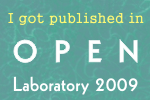Yesterday was Shavuot. That wonderful holiday which includes midnight studies, water-bombing and dairy products. Mmmmm…. cheese. A food product heavily embedded in the science of microbiology. Cheese is the founding product of the biotech industry (along with beer and bread). So here’s to Lactobacilli and Lactococci which are at the center of the production of […]
Scientific Curator – Bioinformatics Interested individuals should apply on-line at www.jax.org/careers, referring to job posting #3256. Contact Jeannine Ross at ext. 6045 with questions. The incumbent in this position plays a critical role in data annotation and curation for the Gene Ontology (GO) and Protein Ontology (PRO) programs at The Jackson Laboratory in Bar Harbor […]
About this time last year, I posted about a new course I was going to teach, Phage Genomics. Briefly: Phage isolation, electron microscopy, DNA sequencing in the first semester, annotation and comparative genomics in the second. And I get to teach the bioinformatics bit: annotation and comparative genomics. Woo-hoo! The great thing about this course, […]
This tweet from Neil Degrasse Tyson jolted me from a pleasant rest before tomorrow’s race: …which led to the (in)famous Scopes Trial. On May 5, 1925 John Scopes was charged and subsequently tried, found guilty, and fined $100 for teaching Evolution, a violation of Tennessee’s Butler Act. The trial became a battleground for science […]
Here is a study that looked for a type of genes that the authors felt was neglected by classic genomic annotation. The research shows how to employed concepts in molecular evolution to validate the existence of these genes. Some background: the first question we ask after assembling a genome is: “where are the genes”? Not […]
Great meeting: Biocuration 2012, Georgetown University, DC. When I leave a meeting with my head exploding with new ideas and a need to try them all out at once, I know I got my money’s worth, and then some. Even a three hour flight delay followed by discovering my car with a dead battery […]
NSF grant funded, woohoo! Now I am hiring a programmer. So if you want to be part of a dynamic, growing lab, do lots of interesting stuff and upgrade yourself from just a great bioinformatician to a super-bioinformatician, this job’s for you. You’ll be working primarily on microbial genome evolution, including setting up a kick-butt […]
(Originally published March 14, 2009) Happy Pi (π) Day! Americans write dates in the MM/DD/YYYY format instead of the DD/MM/YYYY format used by the rest of the world. Usually a rather painful and confusing format if you did not grow up with it, causing checks to bounce and leases to expire for those who recently […]
A quick post for International Women’s Day: how did the gender symbols originate in biology? What do ♀ and ♂ actually stand for? The answer starts in antiquity, when planets and gods were almost synonymous. Religious rites (at least in Europe) were also associated with the working of metals. Thus, each heavenly body was associated with a […]
We have some really talented students in our department. And I don’t just mean the science. I am honored to present the colorful and hilarious microbial artwork of Amber Beckett. Created between gel runs at Natosha Finley’s lab:
There has been quite a lot of chatter recently about different scientific publishing models. Prompted by Elsevier’s support for the Research Works Act, and the resulting proposed academic boycott. Let there be no mistake: I value the Open Access (OA )model of publication, for both moral and practical reasons that have been elaborated upon in […]
Here is a video produced by Sally Rockey and her team showing changes in age distribution of NIH Principal Investigators and medical school faculty. Rockey is NIH’s Deputy Director for Extramural Research, serving as the principal scientific leader and advisor to the NIH Director on the NIH extramural research program. The video compares the average […]
Continuing with rather philosophical musings about life, Ed Trifonov has recently suggested a new approach to defining life: let’s just vote on the definition. So how does that work? And why should it work in the first place? Note that I am diving straight into the subject, and not prefacing this post with a review […]





